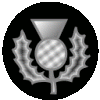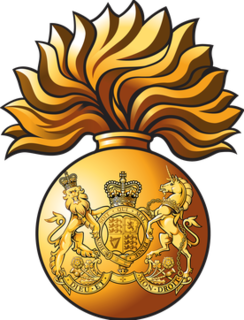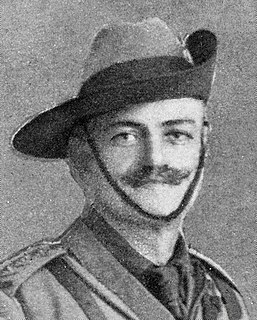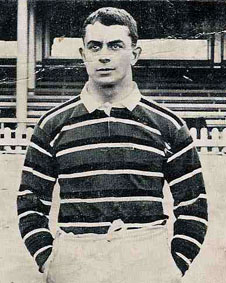
The Dean Cemetery is a historically important Victorian cemetery north of the Dean Village, west of Edinburgh city centre, in Scotland. It lies between Queensferry Road and the Water of Leith, bounded on its east side by Dean Path and on its west by the Dean Gallery. A 20th-century extension lies detached from the main cemetery to the north of Ravelston Terrace. The main cemetery is accessible through the main gate on its east side, through a "grace and favour" access door from the grounds of Dean Gallery and from Ravelston Terrace. The modern extension is only accessible at the junction of Dean Path and Queensferry Road.

The 9th (Scottish) Division, was an infantry division of the British Army during the First World War, one of the Kitchener's Army divisions raised from volunteers by Lord Kitchener to serve on the Western Front during the First World War.

The King's Own Scottish Borderers (KOSBs) was a line infantry regiment of the British Army, part of the Scottish Division. On 28 March 2006 the regiment was amalgamated with the Royal Scots, the Royal Highland Fusiliers, the Black Watch, the Highlanders, the Argyll and Sutherland Highlanders, 52nd Lowland Regiment, and 51st Highland Regiment to form the Royal Regiment of Scotland, becoming the 2nd Battalion of the new regiment. However, after just a few months the battalion merged with the Royal Scots to form the Royal Scots Borderers. In 2021, the battalion was disbanded and its personnel transferred to the 1st Battalion, Ranger Regiment.

The 32nd Division was an infantry division of the British Army that was raised in 1914, during the First World War. The division was raised from volunteers for Lord Kitchener's New Armies, made up of infantry 'Pals battalions' and artillery brigades raised by public subscription or private patronage. The division was taken over by the War Office in September 1915. It served in France and Belgium in the trenches of the Western Front for the duration of the war. It saw action at the Battle of the Somme, the Pursuit to the Hindenburg Line, the Defence of Nieuport, the German spring offensive, and the Allied Hundred Days Offensive beginning at the Battle of Amiens. After the Armistice it marched into Germany as part of the Army of Occupation.

The Royal Scots Fusiliers was a line infantry regiment of the British Army that existed from 1678 until 1959 when it was amalgamated with the Highland Light Infantry to form the Royal Highland Fusiliers which was later itself merged with the Royal Scots Borderers, the Black Watch, the Argyll and Sutherland Highlanders and the Highlanders to form a new large regiment, the Royal Regiment of Scotland.

The Allies of World War I or Entente Powers were a coalition of countries led by France, Britain, Russia, Italy, Japan, and the United States against the Central Powers of Germany, Austria-Hungary, the Ottoman Empire, Bulgaria, and their colonies during the First World War (1914–1918).

James Colin Campbell was a Scottish-born film director, actor and screenwriter. He directed more than 170 films between 1911 and 1924. He also wrote for 60 films between 1911 and 1922. He was born in Scotland, and died in Hollywood, California.
The 1907 Home Nations Championship was the twenty-fifth series of the rugby union Home Nations Championship. Six matches were played between 12 January and 16 March. It was contested by England, Ireland, Scotland and Wales.

Blair Inskip Swannell was an English-born international rugby union forward who played club rugby for Northampton, and internationally for the British Isles and later Australia. He was invited to tour with the British Isles on their 1899 tour of Australia and then their 1904 tour of Australia and New Zealand. He played a total of seven Test matches on these tours, and scored one Test try – against Australia during the 1904 tour. After settling in Australia, Swannell played a single game for his new home when they faced New Zealand. He was viewed as a violent player, and this made his unpopular with other players. Former Australian captain Herbert Moran said of him that "... his conception of rugby was one of trained violence".
David Dickie Howie was a rugby union player, who represented Scotland and Kirkcaldy RFC. He enlisted as a trooper in the local yeomanry in September 1914, at the start of the First World War. After undergoing training in England, he was commissioned second lieutenant in the Royal Field Artillery in April 1915 and despatched to Gallipoli in August. During the evacuation of Anzac Bay, he contracted pneumonia, and died in Cairo, Egypt, after shooting himself with a revolver while in a state of delirium. He is buried at the Cairo War Memorial Cemetery.

Eric "Puss" MacLeod Milroy was a rugby union player who represented Scotland and Watsonians. He was capped twelve times for Scotland between 1910 and 1914, his first appearance coming as a surprise replacement for the Scottish captain, George Cunningham. He was selected for the 1910 British Isles tour to South Africa after other players were forced to withdraw. Due to illness, he only participated in three matches, and did not take part in any of the tests against South Africa. In 1914, he captained Scotland against Ireland, and against England in the last international match before the outbreak of the First World War.
John George Will, nicknamed the "Flying Scot," was a Scottish rugby union player and a Lieutenant in the Royal Flying Corps killed in World War I.
Events from the year 1915 in Scotland.
Albert Lewis Stewart, was an Irish rugby union player and decorated British Army officer. He played for North of Ireland Football Club from 1907 to 1914, and made three appearances for the Ireland national rugby union team. During World War I, he served in the Royal Irish Rifles and the Machine Gun Corps. He was killed in action in the Battle of Broodseinde during the Battle of Passchendaele.
Elections to Liverpool City Council were due to be held on 2 November 1914.









